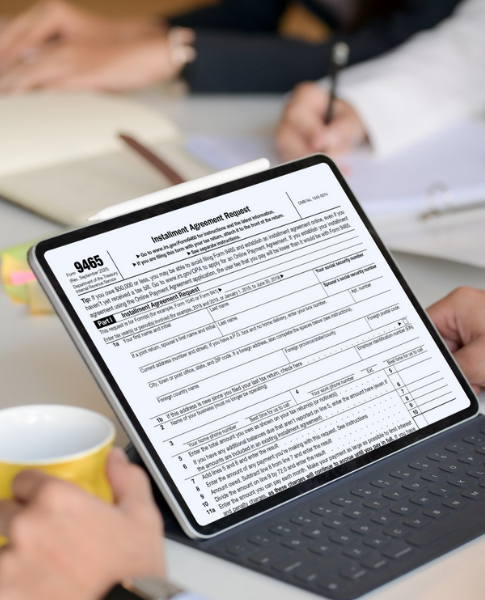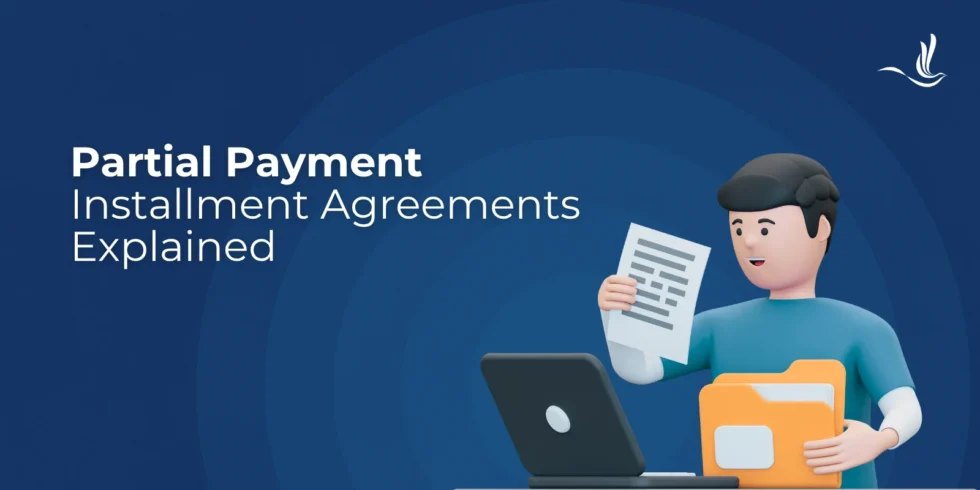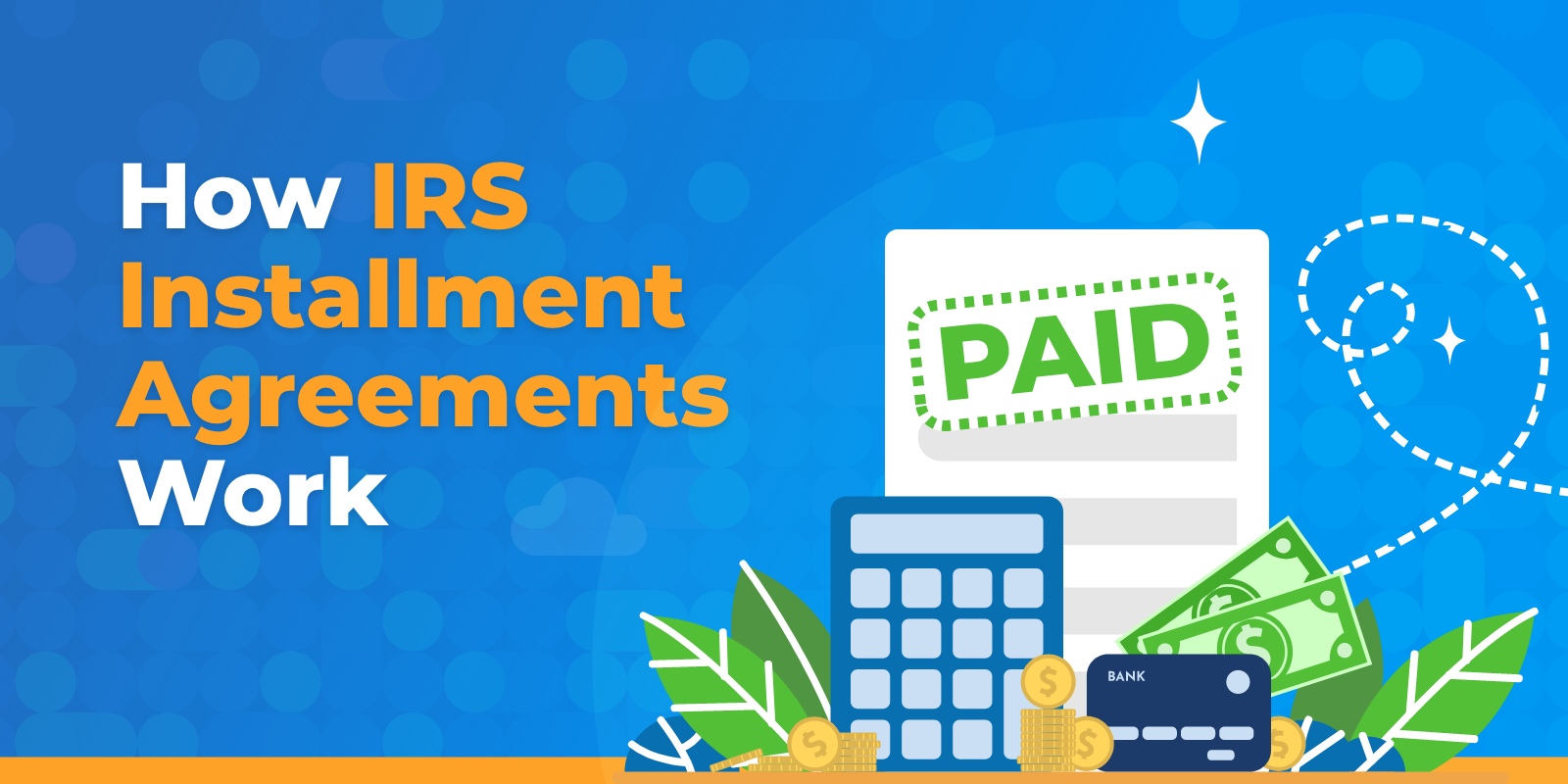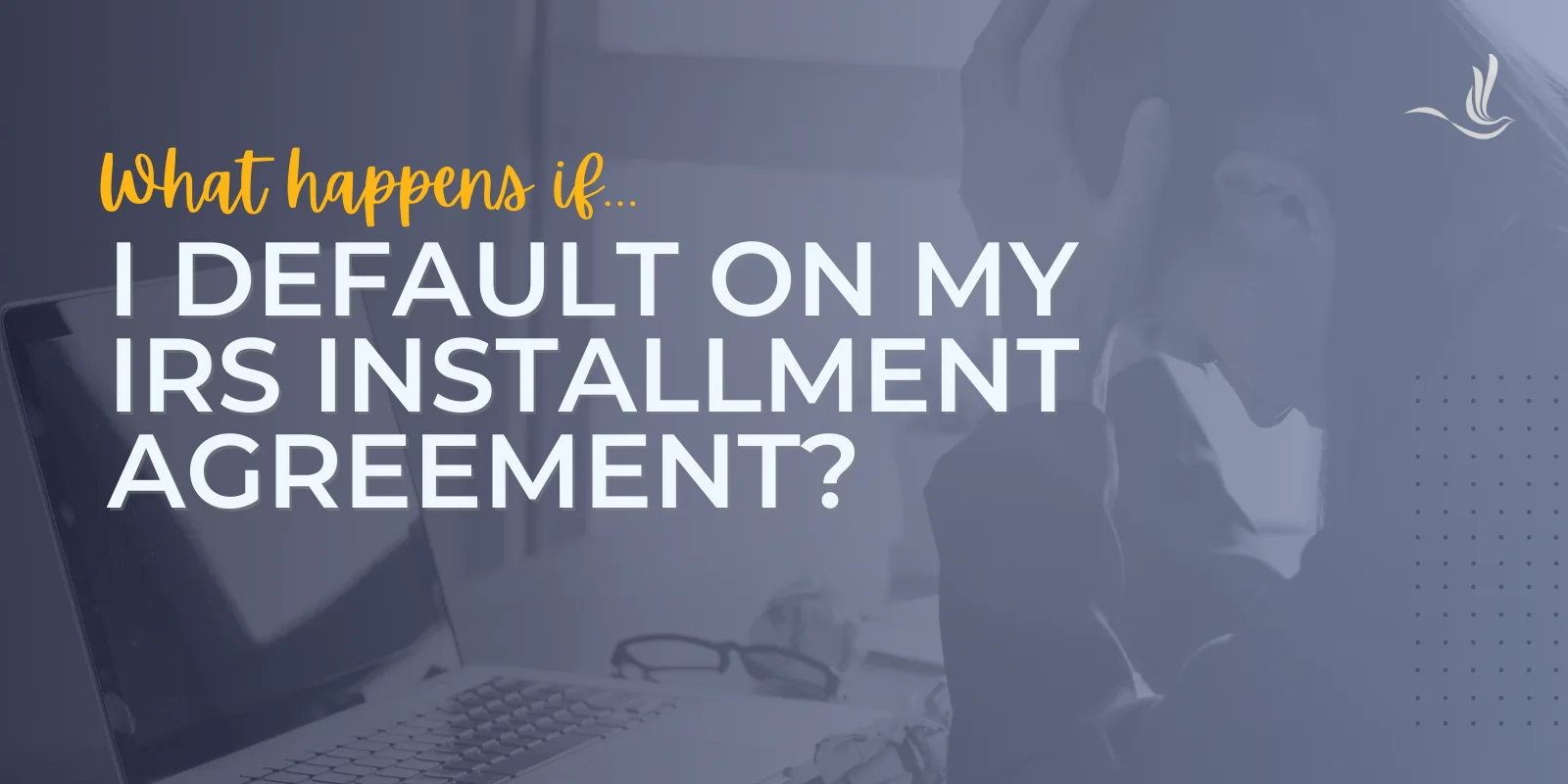Home » Our Services » Tax Negotiation »
IRS installment Plans
What is an IRS Installment Agreement?
If you cannot pay your tax liabilities in full, the IRS may agree to let you pay it off gradually in monthly payments as part of an IRS installment agreement (also referred to as an installment plan).
The IRS knows that many taxpayers simply cannot pay their back taxes in full, and offering installment arrangements helps prevent serious financial hardship while making it possible to resolve outstanding tax obligations over time. Since the IRS collects interest on past due amounts, it does not actually burden the agency financially to allow taxpayers to pay back taxes in installments. Installment agreements are essentially a “win-win,” helping both the IRS and the taxpayer to achieve their respective goals.

Protection from Penalties and Collection Actions
Setting up an IRS installment agreement can help prevent aggressive IRS collection actions. Once your plan is approved and you stay current with your monthly payments, the IRS generally suspends enforcement efforts. It’s important to note that this protection only applies while your plan is active and payments are being made on time.
Without an installment agreement, or if an existing agreement has defaulted, the IRS has the authority to take a variety of collection actions, including:
- Wage Garnishment: The IRS can seize a portion of your wages directly from your employer, reducing your take-home pay.
- Bank Levy: The IRS can freeze your bank account and withdraw funds to satisfy your tax debt.
- Tax Lien: The IRS can place a public claim on your property, which can make it harder to sell or refinance your home. If a lien was already filed before your installment agreement, it doesn’t automatically disappear.
In addition to halting collection actions, being on an installment agreement may also reduce your failure-to-pay penalty. Typically, the rate drops to around 0.25% per month instead of the standard 0.5%, lowering the overall cost of your tax debt while you make payments.
By proactively securing a payment plan, you can protect yourself from these consequences, reduce penalties, and regain control over your financial situation.
Types of IRS Installment Agreements
The IRS provides a variety of payment plans to help taxpayers manage their federal tax debt. Each option has different eligibility requirements, repayment terms, and documentation needs. Choosing the right plan depends on your balance, ability to pay, and whether you qualify for simplified programs.
Short-Term Payment Plan
This plan is designed for taxpayers who can pay their balance in 180 days or less. It’s generally available for debts under $100,000, with no setup fee required. Interest and penalties continue to accrue until the balance is fully paid, but no financial documentation is needed. It can usually be established quickly online or by phone.
Guaranteed Installment Agreement
If you owe $10,000 or less and meet IRS eligibility rules, this plan guarantees approval. You must have filed all tax returns, paid prior liabilities, and not had a recent installment agreement. Payments are spread over 3 years, and financial disclosures aren’t required, making it straightforward to set up.
Simple Payment Plans
Simple Payment Plans were introduced in 2025 to make installment agreements easier for those owing $50,000 or less. No financial documentation is needed, and setup can be done online or with IRS assistance, making it easier to qualify and apply. For these plans, repayment can now extend up to the full 10-year collection period.
Direct Debit Installment Agreement
Monthly payments are automatically withdrawn from your bank account with Direct Debit Installment Agreements, reducing the chance of missed payments and lowering setup fees. Direct debit is often required for larger balances and preferred by the IRS for most taxpayers.
Regular (Non-Streamlined) Installment Agreement
Regular IAs are for taxpayers with balances exceeding $50,000 or more complex finances. Approval requires submitting detailed financial information on IRS forms (like Form 433-F, 433-A, or 433-B for businesses), including income, expenses, and assets. While approval isn’t guaranteed, it allows repayment over the remaining IRS collection period.
Partial Payment Installment Agreement (PPIA)
PPIAs are for taxpayers who cannot pay the full balance before the IRS collection period ends. Payments are based on what you can afford, and financial information must be provided for review. The IRS reassesses your ability to pay every two years to adjust payments if possible.
Streamlined Installment Agreement (Businesses Only)
This plan is for businesses with assessed tax debts of $25,000 or less (or $50,000 for out-of-business sole proprietors without employees). No collection information statements or federal tax lien notices are required if eligibility criteria are met. Setup is quick using the IRS Online Payment Agreement, and choosing direct debit lowers setup fees while automating monthly payments.
How to Calculate Your IRS Installment Payment
Minimum payments are calculated based on debt, penalties, and interest over the plan’s term. Short-term plans are usually for balances paid in full within 180 days, while standard agreements can last several years. For partial payment agreements, the IRS calculates payments based on your disposable income.
Not sure which plan is right for you? Our team can help you determine the best option for your situation.
Eligibility Requirements for IRS Installment Agreements
To qualify for an IRS installment agreement, you generally must have filed all required tax returns, be current on other federal tax obligations, and have made any required estimated tax payments or had adequate withholding. Eligibility also depends on the type of plan and the amount owed.
Short-Term Payment Plan
Available for individuals who can pay their balance in 180 days or less, typically for debts under $100,000. No financial documentation is required, but you must be current on estimated tax payments or withholding to qualify.
Guaranteed Installment Agreement
Designed for taxpayers owing $10,000 or less who have filed all returns, paid prior taxes, and haven’t had an installment agreement in the last five years. Current estimated payments or withholding must be up to date. Approval is guaranteed if all conditions are met.
Simple Payment Plans
Available to most individuals owing $50,000 or less. No financial disclosures are required, but current estimated tax payments or withholding must be maintained. Plans can be set up online or with IRS assistance.
Direct Debit Installment Agreement
This plan requires monthly payments to be automatically withdrawn from your bank account. Eligibility is similar to other agreements, and current estimated payments or withholding must be maintained. Direct debit helps reduce setup fees and lowers the risk of missing payments, making it preferred by the IRS for most qualifying taxpayers.
Regular (Non-Streamlined) Installment Agreement
This plan is for taxpayers owing more than $50,000 or with complex financial situations. It requires detailed financial disclosure on IRS forms, including income, expenses, assets, and liabilities. Payments are structured based on IRS review, and you must be current on estimated payments or withholding. Approval is not automatic, but it allows repayment over the remaining collection period.
Partial Payment Installment Agreement (PPIA)
This plan is for taxpayers who are unable to pay the full balance before the IRS collection statute expires. Monthly payments are based on your ability to pay, and detailed financial disclosures are required. Current estimated payments or withholding must be maintained. The IRS reviews your financial situation every two years to determine if payments should be adjusted.
Streamlined Installment Agreement (Businesses Only)
Businesses with assessed tax debts of $25,000 or less (or up to $50,000 for out-of-business sole proprietors without employees) may apply for streamlined agreements. They must have filed all required returns and be current on estimated payments or withholding. No collection information statements or lien notices are required. Setup is quick via the IRS Online Payment Agreement, and choosing direct debit lowers fees and automates payments.
Applying for an IRS Installment Agreement
Applying for an IRS installment plan involves more than just filling out a single form. Depending on the amount you owe and the type of plan you request, you may need to submit Form 9465 (Installment Agreement Request) to request the agreement, along with a Collection Information Statement (Form 433-A, 433-B, or 433-F) to provide detailed financial information. Generally, it takes four to six weeks to finalize an installment agreement and set up the payment method. However, several factors can affect the turnaround time, including the payment method you choose and current IRS processing times. Your tax professional can guide you through the process to ensure your application is complete, accurate, and structured to fit your financial situation.
Financial Analysis
We review your income, expenses, and existing obligations to determine a plan that is realistic and manageable, helping you avoid defaulting on payments.
Required Documentation
We prepare and submit the necessary forms, such as Form 9465 and, if needed, Form 433-A, B, or F. If required tax returns are missing, we can handle those on your behalf.
Communication with the IRS
We manage all correspondence with the IRS, negotiating favorable terms and ensuring your application is approved as quickly as possible.
How Optima Tax Relief Can Help You
Our tax attorneys and licensed professionals have helped thousands of clients resolve their tax problems through installment agreements and other powerful tax assistance programs offered by the IRS. Our team will work on your behalf, fighting to get you the best possible deal with the IRS so you can put your tax problems to rest. In addition to IRS installment agreements, our team can help with:
- Offers in Compromise: Settle tax debt for less than what you owe
- IRS Penalty Abatement: Reduce or remove IRS penalties and fees
- Currently Not Collectible Status: Temporarily pause collections due to financial hardship
- Tax Liens: Resolve IRS liens and protect your assets
- Wage Garnishments: Stop or reduce IRS wage garnishments
- Bank Levies: Prevent or release levies on bank accounts
- Innocent Spouse Relief: Protect spouses from joint tax liabilities
- IRS Appeals: Challenge IRS decisions with professional guidance
- Tax ID Theft: Recover from identity theft on your taxes
- Audit Representation: Expert support during IRS audits
- Unfiled Tax Returns: File overdue taxes and regain compliance
- Payroll Tax Relief: Resolve business payroll tax issues efficiently
For more information on our tax relief services, we welcome you to call us for a free consultation: (800) 536-0734.
Optima Tax Relief, LLC is a tax resolution firm independent from the IRS. This content is made available for informational and educational purposes only. Nothing included in the content should be taken as a guarantee, warranty, prediction, or representation about your specific situation. This content is not intended to be a substitute for professional advice and services. We encourage you to consult with a tax professional to discuss your specific tax matters. Individual results may vary. We do not provide tax, financial, bankruptcy, accounting, or legal advice and nothing contained in this content is intended nor shall be construed as such.
Installment Agreement Blog Articles

Partial Payment Installment Agreements Explained
Get an in-depth look at Partial Payment Installment Agreements (PPIAs), including eligibility, benefits, the application process, and more.

How IRS Installment Agreements Work
Here’s an overview of how IRS installment agreements work, including eligibility criteria, application processes, types of agreements, and key considerations.

What Happens if I Default on My IRS Installment Agreement?
Learn the potential repercussions of defaulting on an IRS installment agreement and the steps you can take to mitigate them.
Let Optima Tax Relief Help
Call 1-800-536-0734 for a free consultation.
Let Optima Tax Relief Help
Call 1-800-536-0734 for a free consultation.